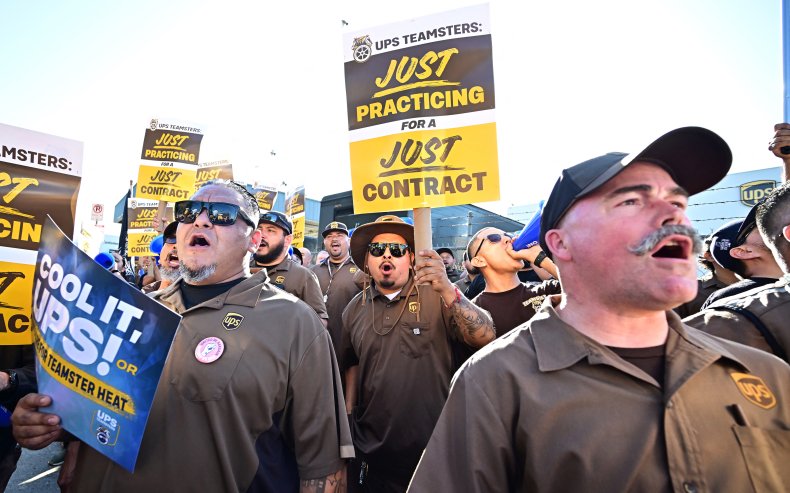A tentative deal was reached on Tuesday between UPS and the International Brotherhood of Teamsters, affecting more than 340,000 of the company's U.S. employees as part of a proposed five-year contract that could avoid economic catastrophe.
Negotiations have taken place since April, with talks heating up in the past month as the current contract was set to expire July 31. The deal still needs to be voted on.
"Together we reached a win-win-win agreement on the issues that are important to Teamsters leadership, our employees and to UPS and our customers," Carol Tomé, UPS chief executive officer, said in a statement provided to Newsweek. "This agreement continues to reward UPS's full- and part-time employees with industry-leading pay and benefits while retaining the flexibility we need to stay competitive, serve our customers and keep our business strong."
Teamsters General President Sean O'Brien, who previously requested that the White House and members of Congress not intervene in the collective bargaining process, said the proposed deal "changes the game."

"Rank-and-file UPS Teamsters sacrificed everything to get this country through a pandemic and enabled UPS to reap record-setting profits," O'Brien said in a statement. "Teamster labor moves America. The union went into this fight committed to winning for our members. We demanded the best contract in the history of UPS, and we got it."
The new agreement would put $30 billion in "new money" on the table on behalf of UPS workers, he added. The only UPS strike took place in 1997.
Teamsters General Secretary-Treasurer Fred Zuckerman said in a statement that this is the most "dramatic" national contract he has ever seen agreed to in his 40-plus years of negotiations.
When reached out for additional comment, a Teamsters spokesperson referred Newsweek to O'Brien's statement.
Here are some details of the tentative agreement:
- Existing full- and part-time UPS Teamsters will get $2.75 more per hour in 2023, and $7.50 more per hour over the length of the contract.
- New part-time hires at UPS would start at $21 per hour and advance to $23 per hour.
- Wage increases for full-timers will keep UPS Teamsters the highest-paid delivery drivers in the nation, improving their average top rate to $49 per hour.
- General wage increases for part-time workers will be double the amount obtained in the previous UPS Teamsters contract ratified in 2018, while existing part-time workers will receive a 48 percent average total wage increase over the next five years.
- All UPS Teamster drivers classified as 22.4s (junior drivers who work Tuesdays through Saturdays) would be reclassified immediately to regular package car drivers and placed into seniority, ending the two-tier wage system.
- All larger delivery vehicles, Sprinter vans and package cars purchased after January 1, 2024, will be equipped with air conditioning. All cars get two fans and air induction vents in the cargo compartments.
- There will be no more forced overtime on Teamsters drivers' days off, with drivers keeping one of two workweek schedules.
There are more than 60 total changes and improvements to the National Master Agreement, the largest private-sector collective bargaining agreement in North America. The number is higher than at any other time in Teamsters history, with zero reported concessions from the rank-and-file.
Avoiding multibillion-dollar catastrophe
Last week, an analysis by the consulting firm Anderson Economic Group (AEG) found that a strike by unionized UPS employees could be one of the costliest in at least a century in the U.S.
Taking into account lost wages by striking workers, lost earnings for UPS, lost goods, services and worker wages in other industries, and direct losses to consumers who benefit from products, it was estimated that in a 10-day period, a loss of about $7 billion could be incurred.
"Because UPS delivers so broadly across the United States and is part of the entire economy, every single industry, we expect the damage from a Teamster strike against UPS would reach every medium, large town in America and many small towns," AEG Principal and CEO Patrick Anderson told Newsweek last week. "That's even if it's just a week or 10 days."
Those hit hardest would be small businesses, he said, as many have only one carrier and customers would demand their goods arrive on time or threaten to shop elsewhere. He added that a strike would negatively impact small businesses and inconvenience many customers.
"On the whole, the U.S. economy is big enough that it can absorb this kind of body blow and I don't think we'll have a recession," he said.
Kate Bronfenbrenner, director of Labor Education Research and a senior lecturer at Cornell University's School of Industrial and Labor Relations, told Newsweek on Tuesday that although certain worker demands have been settled, she's unsure if wage increases are going to be enough for the rank-and-file to ratify a contract.
"It's a big increase, but it's just that they are angry. The workers are angry," Bronfenbrenner said. "So, this is a tough time for contract ratification. We've seen over and over again leaders bringing contracts to the rank-and-file, and the rank-and-file rejecting those."
UPS contracts tend to typically run for five years, which she said could pose a problem for workers if the economy bottomed out and they were locked into a long-term deal. She tends to encourage unions to agree to shorter-term deals but acknowledges that appeasing the demands of some 340,000 employees is a bigger challenge.
"It's one more reminder to unions and workers that to get a good contract, you need to organize and show your power," she said. "And if the Teamsters had not done the massive organizing they did with the workers, with the public, really getting their issues out there, focusing on the issues that really resonate with the workers and the public, they wouldn't have this contract. That lesson is very much there."
Workers from other industries may attempt to emulate similar deals. Currently, Hollywood is affected as actors and members of the Writers Guild of America (WGA) are on the picket lines.
"We're in a moment where striking is becoming normalized again," Gabriel Winant, an assistant professor of U.S. history at the University of Chicago, told Newsweek. "After a long lull, right across the '90s, 2000s, 2010s, declining strike rates have been ticking upward.
"Hollywood is on strike right now. It is fairly likely that we're gonna see the UAW on strike by the end of the summer or in the fall. There have been tons of teachers' and nurses' strikes in the last few years. That contributes to the general atmosphere that...emboldens union workers to strike and makes it more economically difficult for the employer to find workers to cross the picket line."
On July 31, representatives of the 176 UPS Teamster locals in the U.S. and Puerto Rico will meet to review and recommend the tentative agreement—at which point all UPS rank-and-file members will receive a list of improvements in the contract.
Member meetings will take place over a period of several weeks. Member voting is scheduled to begin August 3 and conclude August 22.








